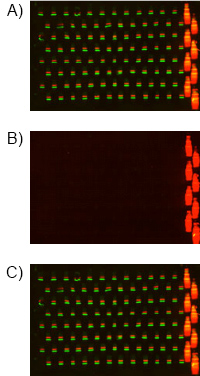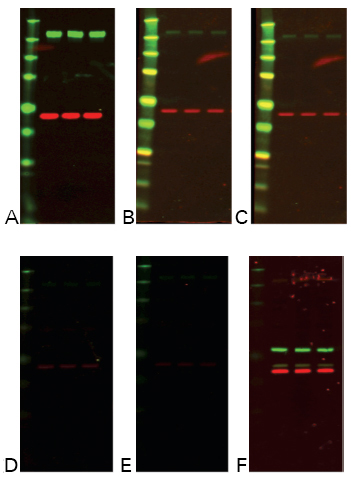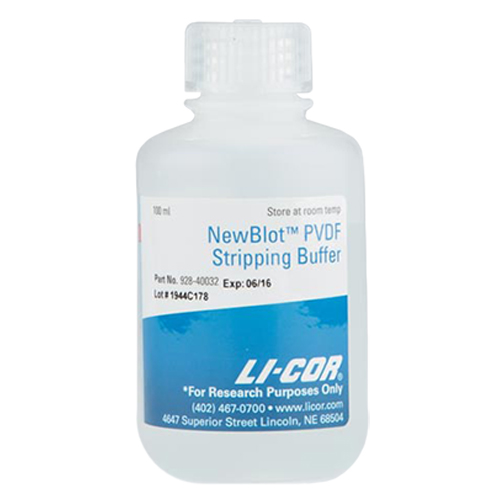NewBlot PVDF stripping buffer is specially formulated for IRDye® secondary antibodies including IRDye 800CW, IRDye 680RD, and IRDye 680LT.
NewBlot PVDF is intended for PVDF membranes only and is ideal for removal of secondary antibody.
Choosing the Right Stripping Buffer
Specifications
NewBlot PVDF Stripping Buffer is supplied as 5X concentrated solutions. Each 100 mL bottle is sufficient for up to 3000 cm2 or approximately fifty 7 x 8.5 cm Millipore® Immobilon®-FL PVDF membranes.
NewBlot PVDF stripping buffer contains hazardous materials and additional shipping costs will be applied.
Example Data


Factors Affecting Efficiency when Using NewBlot PVDF Stripping Buffer
Recommended standard conditions: 1X NewBlot PVDF for 20 min at room temperature.
Below are factors that affect stripping efficiency with NewBlot PVDF on PVDF membranes. Figure 2 above shows the effects of incubation time and addition of SDS on stripping efficiency. These blots and protein targets were not sufficiently stripped using the standard Procedure, and optimization was performed.
For optimal stripping results, follow the optimization guidelines in NewBlot PVDF Stripping Buffer pack insert.
Amount of time blot is in stripping buffer
Stripping time has the greatest effect on efficiency.
Increasing the stripping time may lead to increased damage/loss of target antigens, and reduce the success of reprobing.
Sample type and preparation
Even under the most stringent stripping conditions, the fluorescent signal may not be removed completely due to sample load amount, antibody affinity/avidity, and target protein abundance.
Blot handling conditions
Washing, scanning, or stripping efficiency will be affected if the blot is allowed to dry at all during incubation. Keep the blot moist at all times.
Detergent may help remove fluorescent signal
If fluorescent signal remains, try longer incubation times first, followed by addition of SDS.
Temperature used for stripping
If fluorescent signal remains after the above steps, incubation in stripping buffer may be carried out at 37 °C using a water bath or incubator. This should only be attempted if the above optimization steps are unsuccessful.
